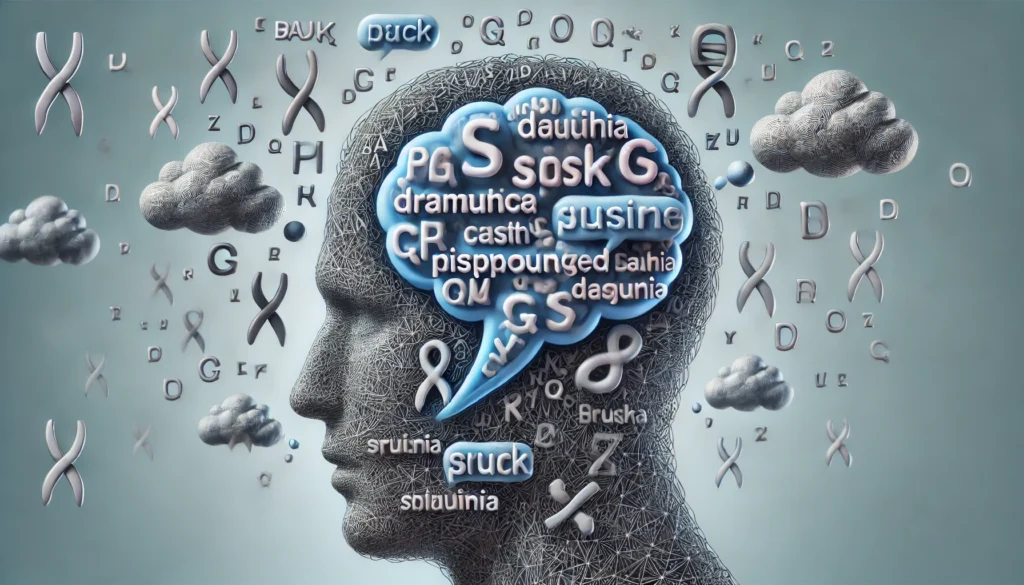In this article, we delve into the phenomenon of mispronounced words in dementia patients, exploring its implications, the science behind it, and practical advice for health and wellness coaches, science journalists, and biohackers alike.
You may also like: Effective Techniques for Short Term Memory Boost
Understanding Dementia and Language
Dementia is not a single disease but a term that encompasses a range of medical conditions, including Alzheimer’s disease, that impair cognitive functioning. It affects memory, thinking, and social abilities severely enough to interfere with daily life. One of the cognitive domains impacted by dementia is language, which can manifest in various ways, including the mispronunciation of words.
The Spectrum of Language Impairment
Language impairment in dementia can vary greatly among individuals, affecting various aspects of communication. Some may struggle with word-finding difficulties, while others may experience a complete loss of speech. This spectrum ranges from mild word substitution errors to severe aphasia, where language ability is significantly compromised. Understanding this spectrum helps caregivers and professionals tailor their approach to each individual’s unique needs.
Neurological Underpinnings
The brain’s intricate network of neurons and synapses is responsible for language processing. In dementia, these neural pathways are disrupted, affecting regions like Broca’s and Wernicke’s areas, which are crucial for speech production and comprehension. As these areas deteriorate, linguistic abilities decline, leading to mispronunciation and other language issues. Researchers are continuously exploring the neurological mechanisms behind these changes to develop targeted interventions.
Cognitive Domains Interlinked with Language
Language is not isolated; it is interwoven with other cognitive domains such as memory, attention, and executive function. For instance, difficulty in remembering words can lead to pauses and hesitations in speech, while impaired attention can affect the ability to follow conversations. Recognizing these interconnected domains provides a holistic view of how dementia affects communication and cognition simultaneously.
Why Mispronunciation Occurs
Mispronunciation in dementia patients occurs due to disruptions in the neural pathways that facilitate language processing. As dementia progresses, these pathways deteriorate, leading to phonetic errors, such as substituting or omitting sounds, and struggling with the articulation of words.
Phonetic and Articulatory Challenges
Phonetic challenges arise when individuals can no longer accurately process sounds, leading to common errors such as sound substitutions or omissions. This might result in words being pronounced differently than intended. Articulatory challenges, on the other hand, involve difficulties in physically producing the sounds, which can manifest as slurred or unclear speech. These challenges highlight the importance of early intervention to maintain communication skills.
The Impact of Memory on Pronunciation
Memory plays a crucial role in language and pronunciation. In dementia, short-term and working memory can be compromised, making it difficult for individuals to recall how to pronounce certain words. This struggle is particularly evident with complex or less frequently used words. Understanding this link can help caregivers develop strategies to support memory retention and improve linguistic abilities.
The Role of Stress and Anxiety
Stress and anxiety can exacerbate language difficulties in dementia patients. The pressure to communicate effectively, especially in social situations, can lead to increased errors and hesitations. This stress-induced language impairment highlights the need for supportive communication environments that reduce pressure and encourage relaxed interaction.
Five Words Commonly Mispronounced Before Dementia
While the mispronunciation of words can vary from person to person, research has identified certain words that are frequently mispronounced in the early stages of dementia. Understanding these words can provide valuable clues for early detection. Here are five words that individuals may struggle with:
1. Specific: Often pronounced as “pacific” or “spacific,” this word can be challenging due to its consonant cluster at the beginning.
Linguistic Complexity of “Specific”
The word “specific” poses a challenge due to its consonant cluster, which requires precise articulation. In dementia, phonetic processing is disrupted, leading to common errors like “pacific” or “spacific.” These variations highlight the difficulties in coordinating speech muscles and processing complex sound combinations.
2. Anemone: Commonly mispronounced as “anenemy” or “anenome,” the complexity of this word’s syllable structure makes it a frequent stumbling block.

Syllabic Challenges in “Anemone”
The word “anemone” is linguistically complex due to its multiple syllables and unusual stress pattern. Dementia patients may struggle with such complexity, resulting in mispronunciations like “anenemy.” Understanding these challenges can guide speech therapy approaches focusing on simplifying syllable structures.
3. February: Many individuals pronounce it as “Febuary,” omitting the first “r” sound, which can indicate early linguistic deterioration.
The Subtlety of “February”
The omission of the “r” in “February” can be attributed to both phonetic simplification and memory lapses. This common error underscores the subtle linguistic changes that can occur even in the early stages of dementia, serving as a potential early warning sign for caregivers.
4. Mischievous: Often pronounced as “mischievious,” this word poses challenges due to its unconventional stress pattern and syllable construction.
Stress Patterns in “Mischievous”
“Mischievous” presents a unique challenge with its unconventional stress pattern, often leading to the mispronunciation “mischievious.” This highlights the difficulties dementia patients face with stress patterns and syllable construction, pointing to areas where targeted linguistic interventions can be beneficial.
5. Prescription: Frequently said as “perscription,” this word can be tricky because of the consonant cluster and similar-sounding prefix.
The Prefix Puzzle of “Prescription”
The confusion between “prescription” and “perscription” often arises from difficulties in processing consonant clusters and prefixes. This mispronunciation is a common example of how subtle language changes can manifest in dementia, providing insights into the cognitive decline associated with the condition.
Is Mispronouncing Words a Sign of Dementia?
It’s essential to note that mispronouncing words alone is not a definitive sign of dementia. However, when combined with other cognitive symptoms, it can be an indicator of language decline due to dementia. If you or someone you know is experiencing frequent mispronunciation alongside memory problems or other cognitive changes, it may be beneficial to seek professional evaluation.
Comprehensive Evaluation and Diagnosis
Mispronunciation should be considered alongside other symptoms such as memory loss, confusion, and changes in behavior. A comprehensive evaluation by healthcare professionals can help determine whether these language issues are part of a broader pattern indicative of dementia. Early diagnosis is crucial for effective management and intervention.
Differentiating Between Normal Aging and Dementia
It’s important to distinguish between language changes due to normal aging and those caused by dementia. While occasional word-finding difficulties are common with aging, persistent mispronunciation and other cognitive changes require further investigation. Understanding these distinctions helps in making informed decisions about seeking professional advice.
The Role of Caregivers in Early Detection
Caregivers play a pivotal role in identifying early signs of dementia, including language changes. By being attentive to communication patterns and other cognitive symptoms, caregivers can facilitate timely medical consultations. Training and resources for caregivers can enhance their ability to support early detection and intervention.
Practical Advice for Health and Wellness Coaches
Health and wellness coaches play a vital role in supporting individuals with dementia and their families. Providing accurate and practical advice can significantly impact their quality of life.
Tips for Supporting Communication
- Encourage Patience: Remind family members and caregivers to be patient and supportive when communicating with individuals experiencing language difficulties. A calm and understanding approach can alleviate frustration.
- Simplify Language: Use simple, clear, and direct language. Avoid complex sentences or jargon that may confuse or overwhelm the individual.
- Non-verbal Communication: Encourage the use of gestures, facial expressions, and visual aids to support verbal communication. This can enhance understanding and engagement.
Building a Supportive Environment
Creating a supportive environment involves more than just adapting communication styles; it requires fostering a sense of safety and comfort. Encourage family members to engage in activities that promote relaxation and reduce anxiety. This could include playing calming music, providing quiet spaces, and allowing time for rest. A supportive environment can significantly enhance communication and reduce language-related stress.

Tailoring Communication Strategies
Each person with dementia is unique, and communication strategies should be tailored to individual needs and abilities. Coaches can work with families to identify effective strategies, such as using visual aids or memory books, to support communication. Tailoring approaches ensures that individuals receive the appropriate support to maintain their linguistic abilities.
Educating and Empowering Families
Education is a powerful tool for empowering families to support their loved ones. Providing resources and training on dementia and communication strategies can equip families with the knowledge and skills needed to address linguistic challenges effectively. Empowered families are better able to navigate the complexities of dementia care and advocate for their loved ones’ needs.
Insights for Science Journalists
Science journalists have the unique responsibility of translating complex scientific concepts into accessible and engaging narratives for the general public. When covering topics like dementia and language changes, consider the following:
Crafting Engaging Narratives
- Historical Context: Provide a historical overview of dementia research, highlighting key milestones and breakthroughs in understanding language changes.
- Current Trends: Discuss current research trends and advancements in detecting early linguistic changes in dementia patients. Highlight studies that explore innovative diagnostic tools and interventions.
- Future Implications: Explore the potential future implications of language-focused research in dementia care. Consider the development of new therapeutic approaches and technologies aimed at improving language skills.
Making Complex Science Accessible
Translating complex scientific information into accessible language is crucial for reaching a broad audience. Use metaphors and analogies to explain intricate concepts and avoid jargon that may alienate readers. By making science accessible, journalists can engage the public and foster a deeper understanding of dementia and its impact on language.
Highlighting Personal Stories
Including personal stories of individuals and families affected by dementia can humanize scientific narratives and make them more relatable. Personal stories provide insight into the lived experiences of those dealing with language changes, offering a powerful connection between the science and its real-world implications.
Encouraging Public Engagement
Encouraging public engagement with dementia research can lead to increased awareness and support for scientific advancements. Journalists can create opportunities for readers to participate in discussions, attend events, or support research initiatives. Public engagement fosters a collaborative approach to addressing the challenges of dementia and promoting understanding.
Biohacking and Brain Health
Biohackers are constantly seeking ways to optimize their mental and physical health. Understanding language changes in dementia can inform strategies to enhance brain health and cognitive function.
Biohacking Strategies for Brain Health
- Cognitive Exercises: Engage in activities that challenge language skills, such as crossword puzzles, word games, and language learning apps. These exercises can stimulate neural pathways and promote cognitive resilience.
- Nutritional Support: Focus on a brain-healthy diet rich in antioxidants, omega-3 fatty acids, and vitamins that support cognitive function. Supplements like omega-3s and B vitamins may also be beneficial.
- Mindfulness Practices: Incorporate mindfulness and meditation practices to reduce stress and improve mental clarity. These practices can enhance focus and concentration, supporting overall brain health.
Personalized Brain Health Plans
Biohackers can develop personalized brain health plans that incorporate a variety of strategies tailored to individual needs. By combining cognitive exercises, nutritional support, and mindfulness practices, individuals can create a comprehensive approach to maintaining and enhancing cognitive function. Personalized plans allow for flexibility and adaptability in addressing specific cognitive challenges.
Technological Innovations in Brain Health
The field of biohacking is rapidly evolving with technological innovations that support brain health. From wearable devices that track cognitive performance to apps that provide personalized cognitive training, technology offers new opportunities for enhancing mental acuity. Staying informed about these innovations can help biohackers optimize their approaches to maintaining brain health.
Collaborative Approaches to Cognitive Enhancement
Collaboration with healthcare professionals, researchers, and other biohackers can enhance the effectiveness of cognitive enhancement strategies. By sharing knowledge and resources, individuals can stay informed about the latest research and best practices in brain health. Collaborative approaches foster a community-driven effort to tackle the challenges of cognitive decline and promote lifelong brain health.
Conclusion
Mispronunciation of words in dementia patients is a fascinating yet complex phenomenon that sheds light on the intricate relationship between language and cognitive decline. By understanding the implications of linguistic changes, health and wellness coaches, science journalists, and biohackers can provide valuable insights and support to individuals affected by dementia.
Whether you’re a coach guiding clients, a journalist crafting compelling narratives, or a biohacker optimizing brain health, the knowledge of language changes in dementia can empower you to make a positive impact in the lives of those you serve. Stay informed, stay engaged, and continue to explore the ever-evolving landscape of brain health and wellness.
The Importance of Continued Research
Continued research into the language changes associated with dementia is crucial for advancing our understanding and improving interventions. By supporting research efforts, we can contribute to the development of innovative strategies and therapies that enhance communication and quality of life for individuals with dementia.
Building a Supportive Community
Building a supportive community around individuals with dementia involves collaboration and shared knowledge. By working together, healthcare professionals, caregivers, researchers, and the general public can create a network of support that fosters understanding and empathy. A supportive community is vital for addressing the challenges of dementia and promoting positive outcomes.

Empowering Future Generations
Empowering future generations with knowledge about dementia and its impact on language can lead to greater awareness and advocacy. Education and outreach efforts can prepare younger generations to support loved ones with dementia and contribute to the ongoing effort to improve care and understanding. Empowerment through education ensures a compassionate and informed approach to dementia care in the future.
Further Reading:
Mesulam Center for Cognitive Neurology and Alzheimer’s Disease
Memory Lapse or Dementia? 5 Clues to Help Tell the Difference
Important Note: The information contained in this article is for general informational purposes only, and should not be construed as health or medical advice, nor is it intended to diagnose, prevent, treat, or cure any disease or health condition. Before embarking on any diet, fitness regimen, or program of nutritional supplementation, it is advisable to consult your healthcare professional in order to determine its safety and probable efficacy in terms of your individual state of health.
Regarding Nutritional Supplements Or Other Non-Prescription Health Products: If any nutritional supplements or other non-prescription health products are mentioned in the foregoing article, any claims or statements made about them have not been evaluated by the U.S. Food and Drug Administration, and such nutritional supplements or other health products are not intended to diagnose, treat, cure, or prevent any disease.


